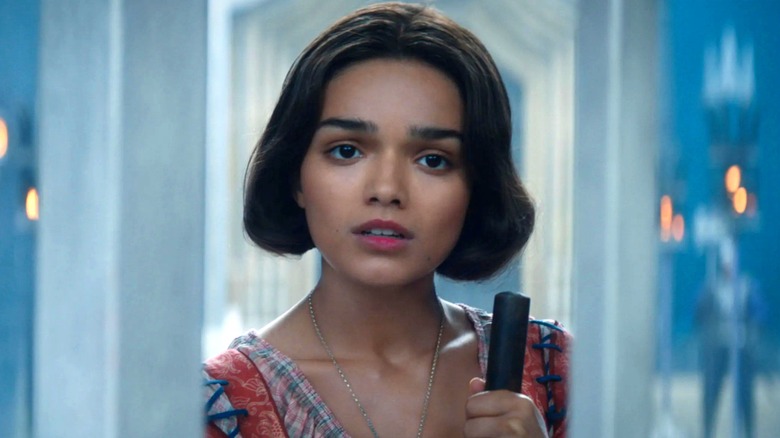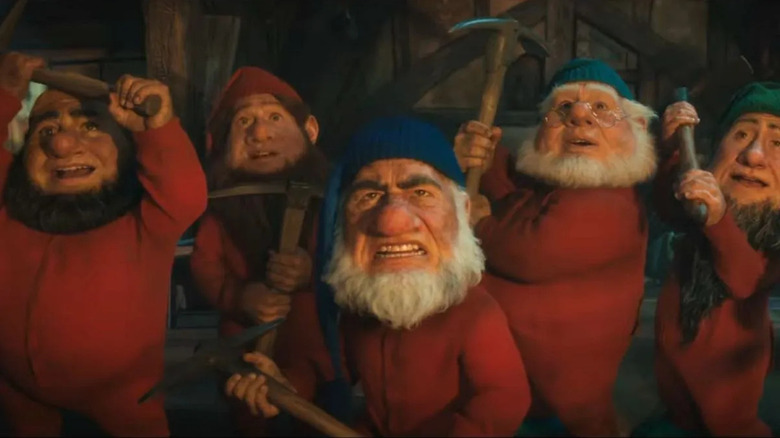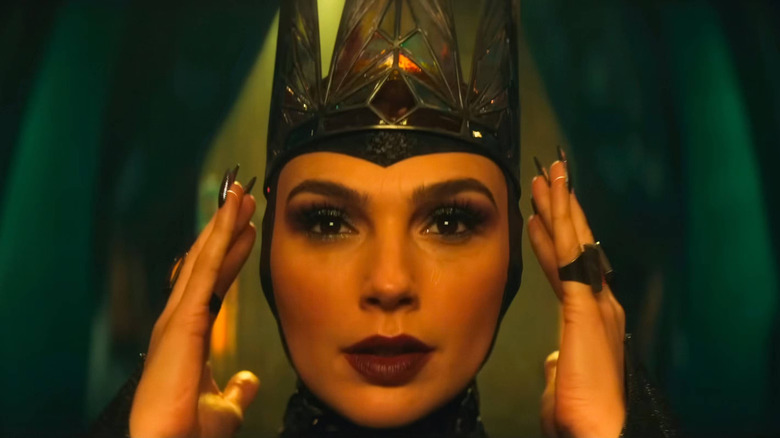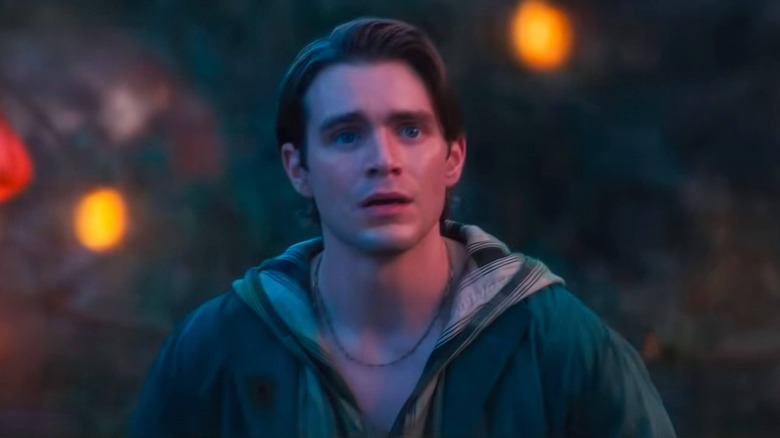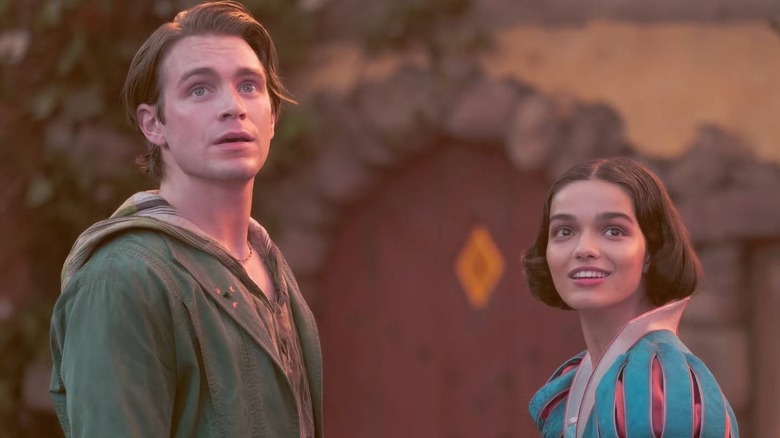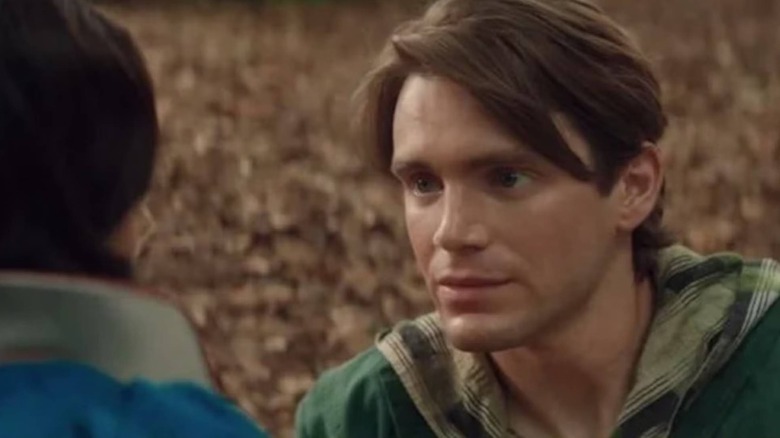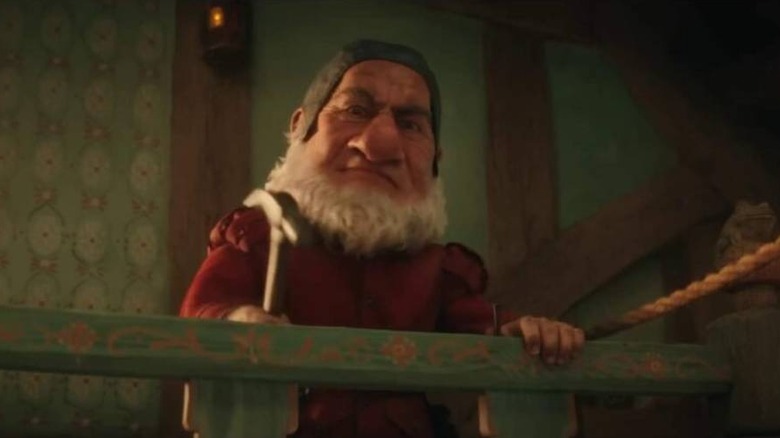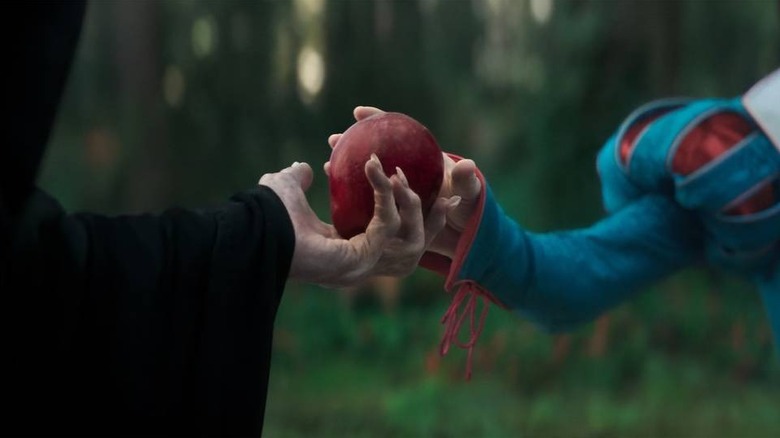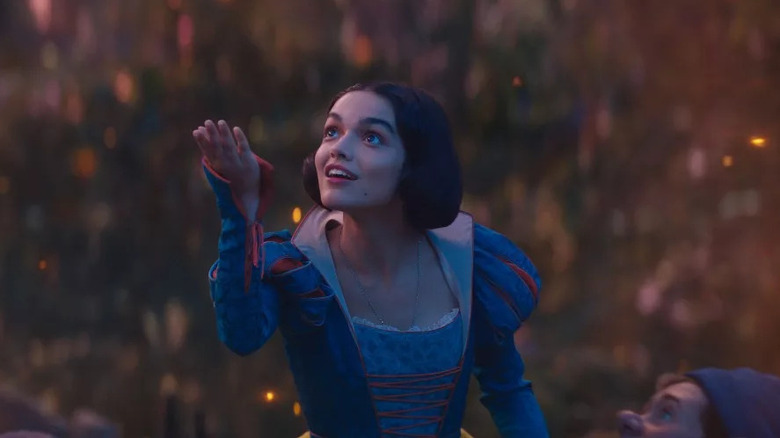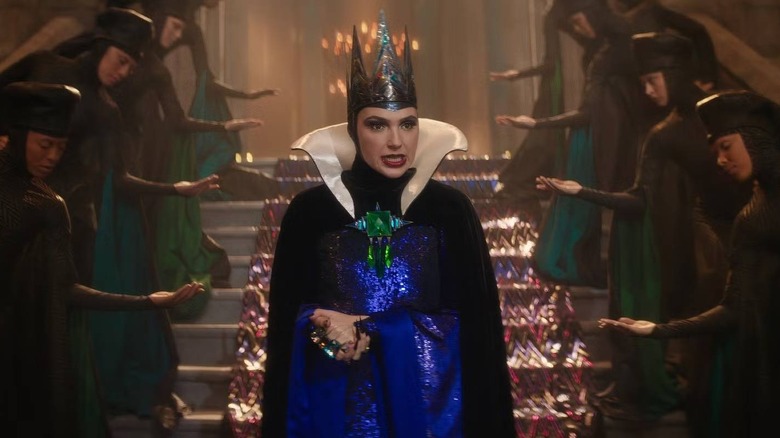Dumb Things We Can't Ignore In Snow White
Disney has seen a lot of success with its live action remakes. Yes, they may be soulless copies of the originals in many ways, but they still tend to make a lot of money. However, ever since it was announced, the studio's "Snow White" remake starring Rachel Zegler has been a lightning rod of controversy. Some of this has been in bad faith, like people complaining about Zegler's casting as the titular character as she's half Colombian and half Polish. Some saw this as an example of Disney trying to diversify its offerings by having someone who is half-white play a character who's traditionally been portrayed as white. Zegler was thrust even further into the firestorm when she said the prince "literally stalks" Snow White in the original film during an appearance at 2022's D23 event.
Certain sections of the internet had labeled the movie as "woke" before a trailer even came out. Yet, despite the backlash against the star, now that the film is finally in theaters it's clear that Zegler is the only part of it that really works. In short, it's been a disaster for the Mouse House: Whether it's the myriad controversies that plagued this project for years or people simply getting tired of these remakes, "Snow White" bombed hard at the box office. The sad fact is that there's no reason to be angry about this film for reasons that have nothing to do with filmmaking, as it does a great job at hindering itself. Here are all the dumb things in "Snow White" that just don't add up.
Making the dwarfs CGI instead of casting actors with dwarfism
Aside from Rachel Zegler's casting, "Snow White" also faced controversy in regard to how it planned on handling the seven dwarfs, who were famously part of the original 1937 movie. On a 2022 episode of the "WTF with Marc Maron" podcast, Peter Dinklage called out Disney for the inclusion of dwarfs in the film. He mentioned how Disney wanted to be inclusive in one way by casting Zegler as Snow White but was also doing something seemingly backwards. "Take a step back and look at what you're doing there," he said. "It makes no sense to me. You're progressive in one way but then you're still making that f***ing backwards story about seven dwarfs living in a cave together, what the f*** are you doing, man?"
While Dinklage wasn't a fan of including dwarfs in the story, other actors with dwarfism insisted this could be a good way for performers with dwarfism to get work in a high-profile project. Instead, Disney did something that makes little sense and hasn't made anyone happy: The seven dwarfs are in the film, but they're CGI creations, which makes them look closer to their 1937 counterparts. It's a completely baffling way to go about this controversy.
On top of this, Martin Klebba, who has dwarfism, voices Grumpy, so Disney got an actor with dwarfism to voice one of the characters but not actually play them in person. The other voice actors for the dwarfs in "Snow White" are individuals without dwarfism. Disney could've been progressive by casting actors with that condition in those roles, potentially making it easier for them to get more work in the future, but they went down a route that pleased nobody.
Gal Gadot's evil queen song
Let's set aside the majority of Gal Gadot's performance in "Snow White," which consists of emotionless faces and bizarre line readings. Instead, let's just focus on the Evil Queen's big musical number — "All is Fair." Villain songs are among some of the most beloved in Disney's repertoire. "Poor Unfortunate Souls" from "The Little Mermaid" is a lot of fun, and "Hellfire" from "The Hunchback of Notre Dame" is genuinely haunting. "All is Fair" is neither of these things. It's clearly going for some sultry vibes that Gadot just can't deliver on.
Tonally, this song sticks out like a sore thumb, not mixing well with the rest of the soundtrack. Other new songs fall into this camp, although "Waiting on a Wish" is one new number that kind of gels. And to be fair to "All is Fair," there's at least some socio-political commentary, with lyrics like "All is fair when you wear the crown." It's effectively the girlboss version of Richard Nixon's famous quote: "When the president does it, that means it is not illegal."
And then the Evil Queen provides... actually good advice to women wanting to get ahead? "Nice won't get the doing done / Ambitious girls must be vicious girls / And boy, they have fun." Does she see herself as merely ambitious rather than a dictator ruining the once prosperous kingdom? It could maybe work if the movie provided some backstory as to why she sees herself as fit to rule, but it's a tonal mishmash of ideas that come together to offer nothing.
Jonathan's song makes him seem like a total jerk
Let's lay off Gal Gadot and focus on another new "Snow White" song that's just baffling from start to finish — "Princess Problems." It's primarily sung by Jonathan (Andrew Burnap), the bandit that takes the place of the prince as Snow White's true love. He and his fellow rebels reside in the forest, holding out hope that the king is still alive (Note: He isn't). Snow White frees him, and when they reunite in the forest after Snow White runs away, he sings this little ditty about how there are bigger things going on than whatever she's dealing with. The problem is... there kind of isn't.
Jonathan sings lyrics like, "That sounds an awful lot like princess problеms / Finally learnin' that life's not fair." He's basically telling her that she has first-world problems, but this song doesn't make sense given its placement in the film. They've met before, and Jonathan knows that Snow White is being kept as a servant in the Queen's palace. Plus, right before the song starts, Snow White literally tells him that the Queen's trying to kill her. It seems she probably knows that life isn't fair at this point and doesn't need some jerk singing about it to her.
The 2010s were filled with articles dissecting Disney princesses and pointing to the darker elements of their storylines, like how Belle in "Beauty and the Beast" only loves the Beast due to Stockholm Syndrome. "Princess Problems" very much feels like it was written in that vein, taking Snow White down a few pegs. But in the context of the film, why would Jonathan sing this to her after seeing first-hand that Snow White's life, at least at this point in time, totally sucks?
Jonathan's outfit is way too modern for the movie
Jonathan picking the worst possible time to point out Snow White's privilege is just the beginning of his issues within the film as a whole. He constantly feels out of place, offering quippy dialogue in contrast to how earnest the film feels most of the time. And that out-of-place aesthetic extends to his wardrobe: He seems to be wearing a green jean jacket and hoodie. It clashes with Snow White's classic blue, red, and yellow dress straight out of the 1937 animated film.
Everyone else looks pretty accurate to the original film, even if the outfits occasionally look more like Halloween costumes than something someone would actually wear. But Jonathan looks far too modern compared to everyone else. Hoodies technically date back to the 12th century, but even those were more akin to cowls. Hoodies didn't really take off until well into the 20th century, and "Snow White" is probably supposed to be set in the 1500s, given the style of the garments.
Jonathan's outfit makes him look like he's supposed to be in some off-Broadway show that pokes fun at fairy tale musicals. 2025's "Snow White" wants to pay homage to the original while updating it to modern sensibilities, resulting in aesthetic clashes that make it feel Frankensteined out of disparate parts. It's part of the problem with every Disney live-action remake, where there's generally a lack of any cohesive style.
Seven forgettable bandits
We don't mean to keep picking on Andrew Burnap's Jonathan, but he's a big part of a lot of the dumb elements of "Snow White." Jonathan gets partnered up with six other bandits in the film who don't really have all that much to do. Two of them kind of have a love story while one of them gets set up to be this great crossbow marksman and then fires a crossbow at the end. Other than Jonathan being the love interest, none of them really have any bearing on the plot, and we think there's a good explanation for why that's the case.
This is merely a theory, but given Peter Dinklage's remarks about having dwarfs in the film, it would stand to reason that Disney wanted to get away from the seven dwarfs at first. Maybe Snow White was originally going to spend much of the runtime with seven bandits instead. This appears even more likely considering the casting of George Appleby (an actor with dwarfism) as Quigg, which could've been a way for Disney to reference the seven dwarfs without having all of them in there. Further down the line, Disney may have gotten cold feet about not including the seven dwarfs and threw them in anyway.
Of course, this is all speculation, but it would explain why the bandits have pretty much nothing to do throughout the movie. Jonathan's presence makes sense as a new love interest for Snow White who gets to spend more time with her before reviving her via a kiss. It'd be a little weird if he was hanging out in the woods all by himself. At the end of the day, his fellow bandits just needed more to do, because we're guessing you can't even recall any of their names.
Grumpy loses his character arc
The standout supporting character in 1937's "Snow White and the Seven Dwarfs" is Grumpy, voiced by Pinto Colvig. Living up to his name, he's the bitter dwarf who just wants Snow White to get out of his home. Sometimes, his feelings toward her come across as extremely sexist, like when he exclaims, "All females is poison! They're full of wicked wiles!" However, by the end of the film, he comes to care for Snow White and even cries when he believes she's died.
Grumpy in 2025's "Snow White" has no such arc, at least not one as pronounced. He doesn't like Snow White at first but is sad after she eats the Evil Queen's poisoned apple (just one aspect of the dark history of Snow White). There's no arc or character development; he just likes her all of a sudden. This is likely due to Dopey, voiced by Andrew Barth Feldman, getting more of an arc in the live-action remake. Snow White teaches him that he doesn't have to be afraid of speaking his mind, and, by the end, he's made great strides. It's a fine arc, but the fact it comes at the expense of Grumpy's development makes the whole thing feel a little anticlimactic.
We can't say for certain, but it's possible that Grumpy's role was minimized to avoid him saying sexist things. It's like how Netflix's live-action "Avatar: The Last Airbender" removes Sokka's sexism from the animated series — realizing that he's wrong to think this way is a major part of his character development in the original. Maybe the behind-the-scenes team just wanted to give Dopey time to shine, but it does seem like an attempt at sanitizing Grumpy. Instead of having him see the error of his ways, the 2025 film simply axes this part of him.
The Evil Queen's poisoned apple no longer makes sense
Jonathan may have more to do in 2025's "Snow White" than the prince did in the original, but that development actually hinders one of the most iconic moments from the story. Perturbed by Snow White, the Evil Queen transforms into an old hag to trick the princess into eating a poisoned apple, which puts her into an eternal slumber where she can only be woken up by true love's kiss. In the 1937 film, the Queen believes Snow White will be buried before anyone can kiss her, and with the prince such a non-factor, it would make sense for her to believe that no one loves Snow White.
Making Jonathan so prominent in the remake actually makes the Queen look like an idiot for pursuing this plan. She knows Jonathan loves Snow White, and instead of killing him to ensure he can never break the spell, she puts him in a dungeon that he easily escapes from. Naturally, he does indeed find Snow White to undo the curse.
Creating a curse that can be broken by true love's kiss is already a pretty big risk, but it's a more understandable plan in the original film. The remake, by fleshing out Snow White's romantic subplot, makes the Queen look pretty dumb. One would assume she had other spells she could use to get Snow White out of the picture that didn't have a massive reset button. Or, you know, the Queen could have simply stabbed Snow White and been done with it. She wanted Snow White's heart in a box earlier; why is she taking such risks the second time around?
Making Snow White more complex with... adjectives
In the beginning of the film, Snow White receives a necklace from her father in the shape of the heart. The necklace reads, "Fearless Fair Brave True," as a reminder to Snow White (and the audience) what qualities they should live by. At the end of the day, this is a children's movie, so really hammering home the themes can be forgiven to an extent. However, this isn't the first time Disney has been so on-the-nose in its live-action remakes.
The live-action "Cinderella" sees the titular heroine be told to "have courage and be kind." Similarly, 2020's "Mulan" sees the words "loyal," "brave," and "true" printed onto Mulan's (Yifei Liu) sword. At a certain point, it just starts to feel lazy, with these movies going out of their way to explain precisely what adjectives the princesses need to embody.
This isn't meant to be a critique of abiding by those lessons. It is, of course, very good to be both courageous and kind, and being fearless and loyal is something to aspire to. Yet, at a certain point, it really exposes how all of these Disney live-action remakes are following the same playbooks. In the case of "Snow White" and "Mulan," the heroines even share two of the same adjectives. Snow White and Mulan are very different characters in their animated forms, but, in live-action, it seems as though everyone's the same, at least when it comes to heroines.
Inconsistent tones
According to various reports and rumors, "Snow White" underwent several different reshoots, and even though we can't know for sure what was changed from the original iteration, it's apparent from the finished product. The movie is ultimately a tonal and thematic mess that can never seem to figure out what it wants to be.
It clearly wants to pay homage to the original at points, with Rachel Zegler literally wearing a carbon copy of Snow White's dress. It wants to have political themes with Snow White encouraging the villagers to stand up to their fascist ruler. It wants to be the same — but different. It wants Snow White not to care about finding true love (but also love is very important). It wants to have dwarfs (but not cast actors with dwarfism to play them). It has classic "Snow White" songs (but also songs that seem to deconstruct such princess narratives like the aforementioned "Princess Problems").
"Snow White" is a film at war with itself. Other Disney remakes have gotten by with copying most of the original and adding an extra song and a couple of new scenes here and there. It's not great, but at least it appeals to people who just want to see what they love. "Snow White" is trying to make everyone happy and it ends up pleasing no one as a result.
